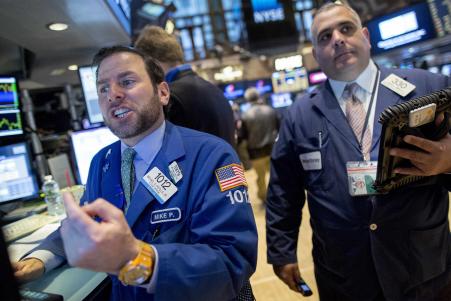Who is Kevin Hassett? Wolfe looks at the Trump ally tipped to become Fed Chair.
By Jessica Menton -
U.S. stocks dropped Friday, with the Dow Jones Industrial Average falling, at one point, more than 100 points. The decline followed a report that the U.S. economy grew slower than expected last quarter. Also, global fears weighed on the financial markets after Greece announced it will not seek an extension to the country’s massive $270 billion bailout program.
In afternoon trading, the Dow Jones Industrial Average, which measures the share prices of 30 large industrial companies, fell 76.91 points, or 0.44 percent, to 17,344.63; the S&P 500 stock index fell 4.86 points, or 0.19 percent, to 2,017.96. The Nasdaq Composite rose 0.57 points, or 0.02 percent, to 4,685.33.
Greece Says It Won't Cooperate With Troika
Greece's government will not cooperate with the so-called troika -- the European Commission, European Central Bank and International Monetary Fund -- and will not seek an extension to the bailout program that ends Feb. 28. The news comes as global stock markets were jittery earlier this week after Greece’s far-left Syriza party won 149 out of 300 seats in the country's Parliament.
Syriza leader Alexis Tsipras opposes the austerity measures that were part of Greece's financial bailout arranged by the troika and accepted by Greece's previous government. Before winning national elections, Syriza led a revolt against the budget cuts and other austerity measures. Shortly after the Syriza electoral win, Tsipras agreed to form a coalition government with the small, right-wing Independent Greeks party and said he would try to renegotiate Greece's debt agreements, the $270 billion bailout package that has allowed Greece to avoid bankruptcy.
Also weighing on global markets Friday were fears over Russia's economy. Its central bank cut a key interest rate to 15 percent, just one month after a surprise hike, sending the U.S. dollar up more than 1.7 percent to a record high against the Russian currency.
Fears are mounting that Russia will slip into recession because of falling crude oil prices and Western sanctions over Russia's involvement in Ukraine's civil war.
U.S. Economic Growth Cools At Yearend 2014
U.S. economic growth cooled last quarter after smashing expectations during the third quarter. Gross domestic product (GDP), the broadest measure of goods and services produced across the U.S. economy, grew at a seasonally adjusted annual rate of 2.6 percent in fourth quarter, missing analysts’ expectations for 3.1 percent growth, according to analysts polled by Reuters. That compares with the surprise 5 percent gain in the third quarter, a 4.6 percent gain in the second quarter and a 2.1 percent decline in the first quarter.
However, analysts say the slowdown in growth last quarter is “nothing to worry about,” according to Paul Ashworth, chief economist at London-based Capital Economics. For the full year, the U.S. economy grew 2.4 percent, the strongest growth since 2010. The U.S. economy also grew 2.2 percent in 2013.
“With the collapse in energy prices providing a considerable boost to households' purchasing power (real personal disposable income increased by 3.8 percent annualized in the fourth quarter), we expect strong consumption growth to continue driving GDP growth in the first half of this year,” Ashworth said in a research note Friday.
The 5 percent gain in third-quarter GDP included a “suspicious looking” 16 percent spike in national defense spending, which was reversed with a 12.5 percent decline in the fourth quarter, Ashworth added.
Separate data Friday showed consumer sentiment jumped this month to its highest level since 2004. Consumer sentiment hit 98.1 in January, up from 93.6 in December, the Thomson Reuters/University of Michigan's final reading for January showed Friday.
